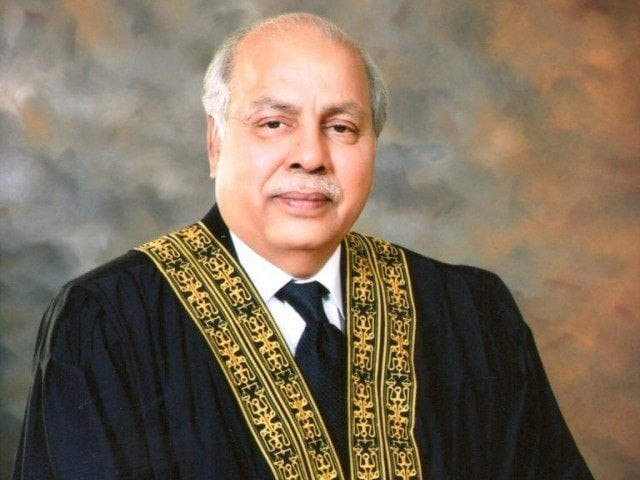No dichotomy between bench and bar, says CJ Gulzar Ahmed
PM’s representative says Imran Khan committed to digitalise, modernise judicial system

Chief Justice of Pakistan Gulzar Ahmed on Friday said he does not make a distinction between the bench and the bar, which are interlinked with each other as he urged lawyers to cooperate with judges in delivery of justice.
“We don’t believe in any dichotomy of the bench and the bar and request lawyers to help us in timely disposal of justice,” the CJ said while inaugurating the Supreme Court Bar Complex in the federal capital.
Justice Umar Ata Bandial, Justice Mushir Alam, Justice Mazhar Alam Khan Miankhel, Justice Yahya Afridi, Justice Qazi Muhammad Amin Ahmed as well as members of bar including Barrister Syed Ali Zafar attended the ceremony. The Supreme Court Bar Association (SCBA) had organized the event.
Speaking on behalf of Prime Minister Imran Khan, Barrister Zafar said the PM is committed to digitalise and modernise the judicial system in Pakistan.
“The government shall facilitate development of ‘Next Generation of Justice Portal’ for the establishment of e-courts,” he said. Barrister Zafar said because of the pandemic, the trial courts have been closed and the superior courts are allowed to work in less than half of their capacities.
“This was a necessary decision in the prevailing circumstance. However, access to justice is a fundamental right and we cannot deprive people of this right until the impact of Covid-19 settles down.”
He suggested introducing digitalization of legal processes as a long-term ‘out of the box’ solution.
“To accomplish this task, ‘Next Generation Justice Platform’, will introduce establishing of 'e-courts' with the facilities of e-filing, audio hearing, video hearings, paper hearings – decisions delivered on the basis of paper submissions,” he said.
He said this modern approach to the judicial system will also solve the long-term issue of delays for which judges and lawyers both are criticized. Barrister Zafar suggested establishing online courts at the district and high courts level in the beginning.
“I know this is a long-term process and would require a considerable time and energy for complete implementation. However, we have to start somewhere. We need to immediately initiate the process where the courts can at least hear witness statements and arguments online.”
Zafar said digitalization of the judicial system would also benefit police and the quasi-judicial authorities.
He requested Justice Mushir Alam, who was present on the occasion, to form a committee consisting of all the stakeholders in the legal fraternity from the Supreme Court to the Attorney General Office to oversee the development and implementation of the ‘Next Generation Portal’ and e-courts.
“All the stakeholders have to agree to join hands and make these changes happen.
“Since our system is out of place and time, to overhaul it we need to bring in technological reforms in line with the advanced and modern judicial system in the world. The government and all other stakeholders are on the same page in this regard,” he said.
Justice Mushir Alam welcomed the PM’s message and pointed out that the judiciary is working on and very much interested in modernizing its judicial system for early disposal of cases. He called upon the government to provide the funds and necessary assistance for implementation of digitalization plan. “The judiciary and executive are on the same page on using technology to improve the system and serve the people who are the real stakeholders,” he added.





1724319076-0/Untitled-design-(5)1724319076-0-208x130.webp)













COMMENTS
Comments are moderated and generally will be posted if they are on-topic and not abusive.
For more information, please see our Comments FAQ